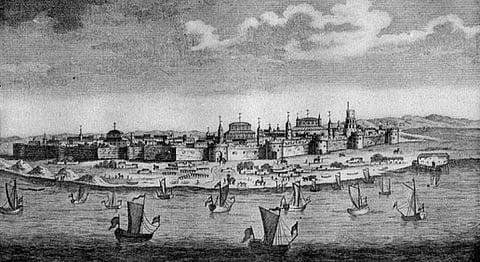
- HOMEGROWN WORLD
- #HGCREATORS
- #HGEXPLORE
- #HGVOICES
- #HGSHOP
- CAREERS
- ABOUT US
- CONTACT US

“What a mixture of clothes and faces, and tribes, and languages, and states!”
- Alexander Pushkin (Russian poet, playwright, and novelist)
Alexander Pushkin’s observation quoted above is most likely said to have been reactionary, a startled expression upon seeing Indian merchants on his visit to Astrakhan. As such, it turns out Russia’s romance with India started long before their love for Raj Kapoor. Historical documents unearthed from Russia’s archives proved to be a treasure trove of information and have shown the existence of an Indian community in the city of Astrakhan, a trading-port situated on the delta of the Volga river that was incorporated into Moscow, dating as far back as the 17th century. The community was small, not more than 200 in number, as stated by scholar Stephen Frederic Dale in Indian Merchants and Eurasian Trade 1600-1750 (Cambridge University Press) and consisted mostly of Marwaris, Sindhis and Punjabis whose trade business thrived at the permanent post that was set up and is said to have been active right up till the 19th century.
Dealers in things that glittered and cured
Archives in Astrakhan, Moscow and St. Petersburg have documented information regarding the workings of Indian merchants and artisans of the age. They were dealers in Astrakhan textiles, jewellery, mostly diamonds, and medicines. Though in his work, Dale points out that it was only about half the community that were actually businessmen, the other half comprised of casual labourers and “those depending on the charity of the Indian community.”
There are several more accounts of Indians living in Russia too. “An English traveler named Forster has described Indians who traveled from India to Astrakhan to propagate their religion – Buddhism, Hinduism and Zoroastrianism; while an Armenian merchant refers to Indians there as cow-worshippers, suggesting that they were mostly Hindus and not Muslims. The Russian archives too contain information on certain Indians who had their living quarters and a temple, along with a trading center, in Astrakhan,” writes Francis C. Assisi.
The traders expanded their businesses to parts of central Russia as well as the nations capital, St. Petersburg. Jamshed Balsara, who has been sifting through the archives and collecting relevant information, reports of the community’s decline in the 19th century, which began with the Russian Empire imposing strict trade restrictions, regulating trade by foreign merchants in the area. The Indian trading post was subsequently shut down in 1840, coinciding with the the expanding colonial rule that led to the dismantling of numerous manufacturing bases in India. By this time, the East India Company had succeeded in taking over large portions of Indian land and the nations resources. Even prior to this, Indian traders had slowly begun to disperse and shift base to central parts of Russia and cities like Moscow, and “many converted to Orthodox Christianity and married Russian women,” says Balsara. They would first ‘Russianise’ their surnames and then change them, he says. Records dating back to the 1740’s mention names of the ‘Russianised’ Indians, with surnames like Ivanov and Feodorov; Dale’s research shows Astrakhan had a Ramdas Dzhasuev from Multan and Talaram Alimchandov, who was from Sind.
It is approximated that currently about 10,000 Indians live in Moscow, with a few thousand strays spread across the rest of the country. It would be really interesting to chart the lineage of those of Indian descent to see if it can be traced back to the community that came to exist in Astrakhan. The city has served as a melting pot of different cultures, a spot where Europe and Asia converged and is said to have housed 1.2 million people from up to 170 different nationalities. It’s only natural that the ‘Russianised Indians’ wanted to assimilate into their newly acquired Russian society’s, it’s not uncommon to come across people with archetypal Russian surnames but strong South Asian physical features. But what is unfortunate is that many of the residents lost their link to their Indian heritage.
